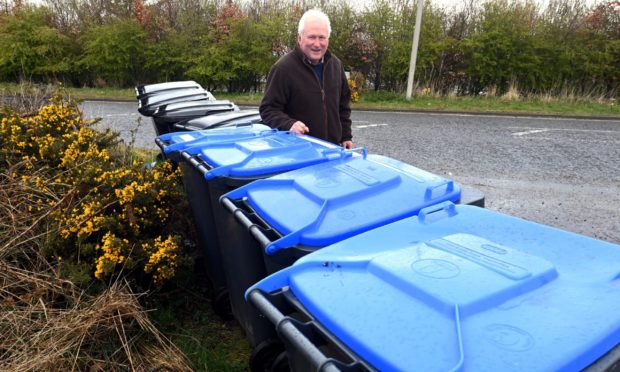With potential changes to bin collections in Aberdeenshire on the horizon – introducing a new, third bin to boost recycling – we answer residents’ questions about the scheme.
Yesterday we reported the proposals are at an “advanced stage”, pending funding from Zero Waste Scotland to make them a reality.
Council chiefs say the move will encourage people to recycle more of their household waste, but concerns have been raised it will over-complicate matters.
North Kincardine councillor Colin Pike said the set-up is “totally dysfunctional” and should be kept as simple as possible.
And a poll of more than 200 readers found 94% are opposed to the changes.
One said they already recycle as much as they can – but still have to load the car with bags of rubbish as their bins fill too quickly.
Others said the new system would be something to get used to, praising it as a step in the right direction for increasing recycling rates.
Frequently asked questions
Earlier this year Aberdeenshire Council published a document explaining some of the changes as part of its 2019-2023 waste strategy. Using this information and this week’s reporting, we answer some of the most frequently-asked questions about the scheme.
Q: What changes are being proposed?
Aberdeenshire Council wants to introduce a third bin to its kerbside collection routine. Currently it collects landfill waste and mixed recycling on alternate weeks, with food waste picked up every week.
The proposed three-weekly cycle would change this to:
- Week 1: Landfill waste, and food waste
- Week 2: Paper and card recycling, and food waste
- Week 3: Non-paper recycling, and food waste
In the new system the general waste bin will be used for non-paper recyclables, with contents of the third, smaller bins destined for landfill.
Q: Why?
The council wants people to recycle more of their household waste, rather than sending it to landfill.
In 2016 it studied 1,200 residents’ general waste bins and found more than half the items inside could have been recycled instead. This amounts to 40,000 tonnes of material every year – at an annual cost of £4.7 million.
Q: What can be recycled?
The types of items currently collected won’t change – just the bins they are placed in.
Residents will still be able to recycle plastics (bottles, pots, tubs and trays), metals (tins, cans, aerosols and foil), paper, card, cardboard and cartons.
Q: When will the changes happen?
The plans are currently subject to funding from Zero Waste Scotland, which has a £70m fund to help councils improve recycling rates. If the application is approved, the changes will be rolled out in stages across the region with households notified ahead of time by post.
Q: How much will this cost?
The council says 120,000 new bins will be required to cover every household in Aberdeenshire, at a cost of around £4.5m.
Q: Isn’t this unhygienic?
In 2014, Zero Waste Scotland conducted an in-depth investigation into the potential health impact of reducing bin collections.
It found that, as long as residents bagged up their waste rather than leaving it loose, and councils picked up food waste separately and regularly, there would be few issues.
Q: What if my new bin is too small?
Aberdeenshire Council found more than 50% the contents of residents’ landfill bins could be recycled instead – so using the new system should prevent any overflows.
A survey in 2018 showed the majority of residents use less than three-quarters of their general waste bins between collections, with almost one-third filling it less than halfway.
The local authority has procedures in place for households to apply for more bins, if required, as well as a network of recycling centres.
Q: Won’t this lead to fly-tipping?
The council says businesses and householders fly-tip already and, during previous changes to bin collections, any increases tend to be short-lived.
